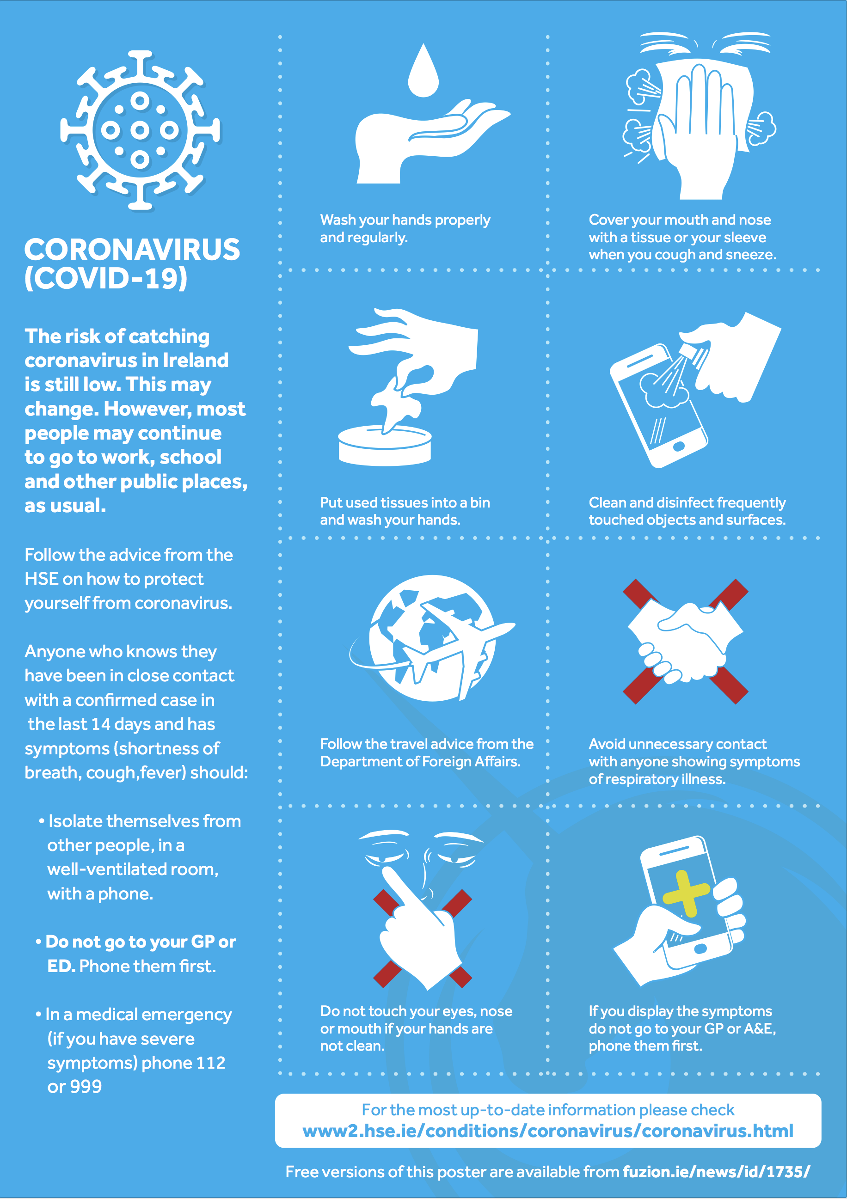The recent news of Covid-19 or coronavirus coming to Ireland is of concern to us all. I am sure you are as glued to the quickly evolving story as we are.
The HSE is advising the risk of catching Covid-19 in Ireland is still low to moderate, but this may change. However, most people continue to go to work, school and other public places, as usual.
While this advice is still in place, it is best practice to introduce some measures in your workplace such as hand sanitiser at entry points and clear advice about hand washing, to keep your team and workplace visitors safe and to avoid any possible spread of the virus.
It is also advisable at this stage to review contingencies around remote working, if this is feasible for all or some members of your team. Another practical approach would be considering remote business meetings, using tools such as Skype, Zoom, Google Meet or Microsoft Teams, so that travel is kept to a minimum.
Our design team in Fuzion have created an infographic based on the HSE advice that you can use in your office to encourage good hand hygiene. You can get a high resolution version of this poster here
As well as the potential health impact of Covid-19, we are already seeing economic implications of the virus and your business could be affected during this time of uncertainty.
The Department of Business, Enterprise Industry have developed a Business Continuity Checklist that is well worth checking out here.
The Role of Communications
If your business is at risk of being affected, you may have a possible communications crisis issue. In this scenario it is best to ensure you follow the below important steps that we have shared with all of our clients.
When a crisis occurs, the need to communicate is immediate. Simple steps to ensure this happens can streamline this process:
1- Agreed Spokespeople
When a crisis occurs, it is best to choose spokespeople most suitable for the situation. Identify your key spokesperson and brief them on what’s happening as well as how your organisation is going to move forward. Then move quickly to respond internally with those messages to your employees. The point here is to quickly alleviate any internal fears or concerns in the workforce.
2– Set up a group on email or Whatsapp only reserved for the crisis with key spokespeople
Crises tend to happen when you least expect them so Whatsapp is recommended so spokespeople can be contacted out of office hours. This group should only have the spokespeople and appropriate decision makers.
3- Act as soon as possible
If it is not possible to give a comment immediately, ensure the journalist is asked for a deadline and the organisation will get back to them asap.
If required, Fuzion can assist you with the response to a crisis, or act as a “gatekeeper” for you with the media. The earlier Fuzion is contacted, the better in order to effectively respond to a crisis or a journalist query for a statement and minimise any damage a crisis can create.
4- Agree a response/Statement as soon a crisis occurs
In the case of Covid-19, it is best to have a statement prepared so your business demonstrates it is ready and prepared for such a serious issue. This statement should outline how the business has prepared for the crisis and plans to move forward.
5- Social Media
If appropriate, share your statement on social media and if a crisis happens on social media, it is advised where possible to take the conversation offline and discuss matters either on direct mail or email.
6- Create a means for monitoring
Once you’ve determined the channel of distribution for your message, monitoring responses is equally critical.
Careful planning and preparation should encourage readiness for any possible crisis.
However, situations will arise in organisations that may require expert advice and in this case, you can contact Fuzion’s Crisis Communication team here.
Advice on Covid-19
Advice on Covid -19 from Public Health bodies such as the World Health Organisation (WHO) and the Health Service Executive (HSE) is to minimise infection risk thorough hand-washing, isolating ourselves if we are ill, and avoiding touching our faces. More information on personal care can be found here.
While the period ahead is uncertain, if we can calmly prepare for the unexpected we will be in a much better position to face any possible escalation of the crisis.
Stay safe and with best wishes
Ciara Jordan and Deirdre Waldron on behalf of The Fuzion Team








